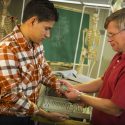Alliance to boost minorities in sciences
With a $2.5 million grant from the Louis Stokes Alliances for Minority Partnerships (LSAMP), a program of the National Science Foundation (NSF), UW–Madison will lead an alliance of 21 state colleges and universities that aims to boost the number of underrepresented minorities who receive bachelor’s degrees in the STEM (science, technology, engineering and math) disciplines.
The Wisconsin Alliance for Minority Participation, or WiscAMP, includes the UW System’s other four-year universities (UW-Eau Claire, UW-Green Bay, UW-La Crosse, UW-Milwaukee, UW-Oshkosh, UW-Parkside, UW-Platteville, UW-River Falls, UW-Stevens Point, UW-Stout, UW-Superior and UW-Whitewater), Alverno College, Beloit College, Lawrence University, Marquette University, Madison Area Technical College, Milwaukee Area Technical College, Nicolet Area Technical College, and the College of the Menominee Nation.
LSAMP is one of NSF’s flagship programs and is conducted with full congressional approval and authorization, says A. James Hicks, LSAMP program director. “Diversity is a part of America’s strength,” he says. “And if America is to remain preeminent in the STEM fields, it must make use of its diversity.”
One key goal of Plan 2008, a UW System-wide effort to reduce disparities in educational outcomes, is to increase retention and graduation rates of students of color, says UW–Madison Provost Peter Spear.
“The WiscAMP grant will help us achieve that goal for our campus and will allow us to collaborate with other Wisconsin colleges and universities to achieve that goal across the state,” he says.
The number of underrepresented minority students who received bachelor’s degrees in science, technology, engineering and math from the four-year alliance institutions in the 2001-2002 school year was only 124, says Douglass Henderson, a UW–Madison professor of engineering physics, associate dean for engineering diversity affairs and the initiative’s co-director.
“This is low,” he says. “Our goal is to try to double that number in the five-year period. The state is losing out by not tapping into this human potential.”
Diversifying the state’s colleges and universities is a priority for each institution, despite budget cuts, says Mary (Molly) Carnes, a UW–Madison professor of medicine and industrial engineering and the initiative’s co-director.
“We are the big research flagship institution that can funnel NSF dollars into the state,” she says. “So we chose to focus on Wisconsin.”
The alliance encompasses all areas of the state’s rapidly changing demography, she says. Milwaukee County alone is home to nearly 250,000 African Americans, while the state’s Hispanic population has doubled in the past decade to 205,000. Almost 70,000 American Indians comprise 11 federally recognized tribal nations and more than 36,000 Hmong call the state home.
At UW–Madison, WiscAMP will:
- Address issues that affect student success in core STEM courses and build on existing successful drop-in tutoring programs for students in beginning chemistry, math, calculus-based physics, statistics, engineering physics and computer science courses. Additional funds will increase the program’s capacity to assist students in these courses, expand training for tutors and add supplementary-instruction sessions.
- Expand an existing program of supplemental instruction by peers beyond the College of Engineering to other core courses.
- Provide funding for three fall-semester sections of intermediate algebra. Currently this course is taught only in the spring semester, making it difficult for freshmen to pursue a STEM discipline, even if they expressed enthusiastic interest.
- Provide academic support for students in “elite” or honors chemistry courses.
- Improve the faculty and graduate-student mentoring that undergraduate summer research student participants receive during their eight-to-10-week research experience. These undergraduate summer research programs provide important graduate-student recruitment opportunities.
- Build a “network of champions” among faculty and administrators within the alliance to share best practices and experiences on diversifying their student populations and improving the institutional culture related to diversity issues.
In addition, UW–Madison will administer a small-grants program, which will enable WiscAMP partner institutions to submit proposals for annual funds ranging from $5,000 to $25,000 to support WiscAMP objectives at their institutions.
UW System Senior Vice President for Academic Affairs Cora Marrett says WiscAMP represents a signal achievement for the institution, which adopted Plan 2008 in 1998. “In this, the second phase of the plan, we join with pride in this national effort to ensure that the workforce for the future draws in all talent,” she says.

